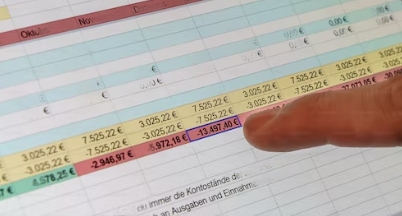Accounting consolidation is an important concept for any business professional, especially those in the financial sector. Consolidation is the process of combining multiple entities or their financial statements into one single report. This process helps businesses better understand their financial standing and can be used to create more accurate financial analyses.

But what exactly does consolidation involve? How can it benefit a business’s bottom line? This article explores these questions and discusses the basics of accounting consolidation.
The Meaning Of Consolidation
Consolidation is a term used in accounting that combines the financial statements of two or more companies into one. The purpose of consolidation is to present a clear and accurate picture of a group of companies’ overall financial health and performance rather than just individual entities.
Consolidation allows for better decision-making, enabling businesses to make informed choices based on reliable financial information.
There are several benefits associated with consolidation. Firstly, it helps reduce redundancy in operations, which can lead to cost savings. Secondly, it facilitates better management of resources and improves coordination among different business units.
Additionally, consolidation enables businesses to use economies of scale by pooling resources such as marketing budgets or procurement processes.
Overall, consolidation helps organisations streamline their accounting practices and operate more efficiently while providing key insights into performance metrics across multiple entities.
Accounting For Consolidation
Consolidation is typically necessary when a parent company owns several subsidiaries or when two companies merge. This process can be quite complex, but it’s essential for producing accurate and transparent financial statements.
One of the first steps in accounting for consolidation is identifying all subsidiaries that must be included in the consolidated financial statements. Once you have identified these entities, you must gather and review their financial statements.
It’s important to ensure each subsidiary has prepared its financial statements using similar accounting principles and methods.
After gathering the subsidiary’s financial information, it’s time to create consolidated financial statements. Consolidated balance sheets, income statements, and cash flow statements should be prepared to reflect the combined results of all subsidiaries involved in the consolidation.
Consolidation Accounting Rules
The Generally Accepted Accounting Principles (GAAP) provide rules for consolidation, ensuring that companies follow standardised procedures. In the UK, GAAP has been replaced by International Financial Reporting Standards (IFRS), which also contain guidelines for consolidation. These rules help ensure consistency in reporting and transparency in financial statements, which can build trust with investors.
Consolidation under GAAP or IFRS requires careful attention to detail and adherence to specific guidelines. Companies must consider ownership percentage, control over subsidiaries, and intercompany transactions when preparing consolidated reports.
The first assumption in consolidation is that all entities involved have a common parent company. This means that one entity controls another through ownership or significant influence. The second assumption is that all transactions between entities in the group are eliminated when preparing consolidated financial statements. This ensures that transactions within the group do not distort the true financial picture of the overall organisation.
Another important rule in consolidation is to ensure consistency across all accounting policies and procedures within each entity being consolidated.
Types Of Consolidation Accounting
Consolidation accounting is a process of combining the financial statements of two or more companies into one. This is done to provide a comprehensive view of the overall financial position of the group. Several types of consolidation methods can be used, depending on the circumstances and objectives of each company.
Full Consolidation
Full consolidation is a type of accounting consolidation commonly used in the UK. It combines a parent company’s and its subsidiaries financial statements into consolidated financial statements. This type of consolidation provides a complete picture of the group’s financial position and performance, as it considers all the assets, liabilities, revenues, and expenses across all entities within the group.
To prepare for full consolidation, a company must first identify its subsidiaries and determine its level of control over each entity. Generally, a subsidiary is controlled by the parent company if it holds more than 50% of its voting rights or has significant influence over its operations. Once established, the parent company can consolidate its financial statements with its subsidiaries.
Proportionate Consolidation
Proportionate consolidation consolidates financial statements where an investor has joint control over an entity rather than full control. Proportionate consolidation is often used when investors own less than 100% of the voting shares in an investee.
Under this method, the investor reports its share of assets, liabilities, revenues and expenses proportionately as if it had direct ownership. This means that each line item in the financial statement is adjusted to reflect the percentage of ownership held by the investor. For example, if an investor holds 60% ownership in an investee, only 60% of that entity’s net income will be reported on their consolidated statements.
Equity Consolidation
Equity consolidation is a type of consolidation used in accounting that combines the financial statements and assets of two or more companies. This process allows companies to understand their financial position better and make more informed business decisions. Equity consolidation is commonly used in the UK, where businesses are required to comply with strict accounting standards.
When two or more companies merge, they often use equity consolidation to combine their financial statements into one comprehensive report. This report provides an overview of the company’s assets, liabilities, revenues, expenses and net income. It also helps identify potential discrepancies or issues that must be addressed before finalising the merger.
Equity consolidation can be a complex process that requires careful attention to detail and accurate reporting. Companies must ensure that all relevant information is included in the consolidated financial statements and that any differences between the individual company accounts are reconciled.
Useful Software And Tools For Financial Consolidation
Financial consolidation is an important aspect of accounting that involves merging the financial statements of multiple subsidiaries or business units into a comprehensive report. This process can be time-consuming and complex, but it’s now easier thanks to modern software and tools. Several options are available if you’re looking for useful software and tools for financial consolidation.

One popular tool is Microsoft Excel, which offers powerful data analysis capabilities and the ability to create detailed financial models. Additionally, many accounting software packages include built-in consolidation features that streamline the process.
For example, QuickBooks is a widely used accounting program in the UK that offers a Consolidation feature that allows users to merge multiple reports into one consolidated report.
Conclusion
In conclusion, consolidation in accounting is an important concept for businesses and organisations to understand. It allows them to maintain accuracy when reporting financial information and provides a more comprehensive picture of the organisation’s overall performance.
By being aware of the differences between parent and subsidiary companies and how they can affect financial statements, entities can ensure they are accurately presenting their financial status. Consolidation also allows companies to analyse their operations better and respond quickly to any changes in the market or industry.
Frequently Askd Questions
Consolidation can have several potential drawbacks. First, it can lead to a loss of competition in the marketplace. Second, consolidation can lead to job losses. When two companies merge, they may need to downsize their workforce to reduce costs and streamline operations. Finally, consolidation can also increase market power for the consolidated entity. This could lead to higher prices and decreased quality of service for consumers.
No, not all businesses are required to consolidate. Generally speaking, consolidation is only necessary when a business has multiple entities that must be combined into one financial statement. This can benefit tax purposes or provide a more accurate picture of the company’s overall financial health.
Consolidation in accounting is combining two or more companies into one entity. Common examples of consolidation include mergers, acquisitions, joint ventures and strategic alliances.
In a merger, two companies combine to form a single entity. Acquisitions involve one company purchasing another company’s assets or stock, making the acquired company part of the acquiring company’s business. Joint ventures and strategic alliances are similar consolidations in which two or more companies join forces to pursue a project or venture together.






